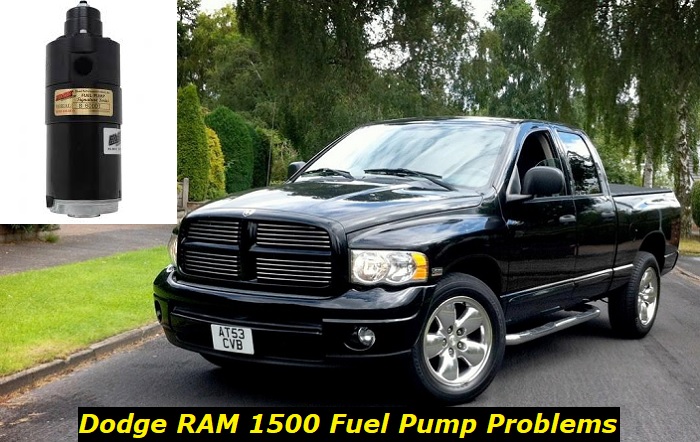One day, the ignition on your truck simply refuses to work. After several attempts, the engine finally turns on. Believing you solved the issue, you hit the road. Little do you know you're about to experience the worst trip of your life.
Fuel supply problems highlights
- Level of importance:Very high
- Can you drive?Usually, no
- DIY inspection:Possible
- DIY repairs:Mostly,impossible
- Price of repair:$300 - $650
- Commonreasons:Fuel pump, fuel filter, fuel lines, EVAP system, electrical problems
- How to fix:Check the pump, verify it has power, check the fuelfilter

Can you drive your 2004 Dodge RAM 1500 with a bad fuel pump?
A fuel pump is an essential component of every modern vehicle. It delivers fuel from the tank to the combustion chamber. If faulty, the performance of your 2004 Dodge RAM 1500 will drop significantly. Since it is connected to the engine, it affects your car's drivability. In case of severe damage, your Dodge RAM 1500 won't start at all. Thus, you won't be able to drive it.
But even if you manage to miraculously start your truck, we advise against driving it. A bad fuel pump is like a ticking time bomb that's just waiting to explode, sometimes even literally. Some 2004 Dodge RAM 1500 owners report smoke or even flame coming from under the hood.
Driving with a bad fuel pump additionally wears down your engine. This may increase the costs of your repairs tenfold. You'll also have trouble keeping your truck in motion due to frequent stalling.
If you suspect your 2004 Dodge RAM 1500 has fuel pump issues, you should have it checked by a professional immediately. Do not use it for long drives as it could be dangerous.
7 common symptoms of a bad fuel pump on the 2004 Dodge RAM 1500
Fuel pump issues manifest themselves in multiple ways. The symptoms severely affect the performance of your truck, making them impossible to miss. Since the pump is connected to the engine, these problems are all related to the engine in one way or another.
Here are the 7 common symptoms of a bad fuel pump on your 2004 Dodge RAM 1500:
1) Your truck won't start all
In the worst-case scenario, your 2004 Dodge RAM 1500 won't start. This is because the pump fails to deliver fuel to the engine. However, your truck may not start for many reasons. These include engine problems, faulty engine coils, and a bad battery. Make sure you go through the other symptoms to ensure an accurate diagnosis.
2) Your truck misfires
Misfiring happens when the engine lacks sufficient fuel to generate enough power. As a result, your 2004 Dodge RAM 1500 will seemingly lose speed as you drive. This may lead you to think you don't have enough fuel in the tank. While this can be true, it may also be because of a bad fuel pump. When the pump can't keep up with the fuel demand, it will result in intermittent power loss.
3) Your truck speeds up randomly
Sometimes, you may experience the opposite of misfiring. Instead of losing power, the engine will produce more than you need. This happens when the fuel pump injects more fuel into the engine than it needs to. Your 2004 Dodge RAM 1500 will then surge forward intermittently, even if you don't hit the gas pedal. This is arguably even more dangerous than misfiring, especially in heavy traffic.
4) Your truck stalls frequently
Much like misfiring, stalling happens when the engine doesn't receive enough fuel. In this case, it gets so little fuel that it can't keep running. This results in stalling, something all drivers hate with a passion. Many issues can cause stalling and a bad fuel pump is right on top of the list. Since it can't deliver enough fuel to the engine, your 2004 Dodge RAM 1500 will lose velocity until it stops moving completely.
This stalling is most noticeable when you're towing heavy loads or driving up a steep hill.
5) Your engine overheats
A bad fuel pump can cause several secondary issues, one of them being overheating. An unsteady fuel supply will cause your engine to strain and generate excessive heat. Stalling may occur as a safety precaution when your engine overheats. It allows it to cool down by cutting off all power.
However, stalling will be the least of your concerns if your engine overheats. High temperatures will cause it to wear down prematurely, leading to high repair expenses. Moreover, it can be life-threatening. Some 2004 Dodge RAM 1500 owners report smoke and even flames coming from under the hood.
You should see the engine temperature on your dashboard. If it passes the recommended value, have your truck checked as soon as possible.
6) You can hear odd noises
The pump draws fuel from the tank to the engine. It generates some humming noises in the process. Under normal circumstances, you can barely hear it. In case the fuel pump's faulty, the noises will grow uncomfortably loud. They come from where the pump's located, which is near the fuel tank itself. If you experience this, it may be time to inspect your fuel pump.
7) Your truck eats up more fuel
Apart from dangerous surging, an excess of fuel can lead to another issue - poor fuel economy. A bad pump draws in more fuel than the engine needs, essentially wasting it. Your 2004 Dodge RAM 1500 will thus consume more fuel to achieve the same performance level as it normally would. As a result, your gas bills will rack up over time.
How long should the fuel pump on my 2004 Dodge RAM 1500 last?
Fuel pumps are built to last. You shouldn't have to replace them for as long as you own your truck. Though some factors may decrease their longevity, they should do fine until you pass the 100,000 miles count. After passing this value, your fuel pump may act up simply because it's too old.
How much does it cost to replace the fuel pump on my 2004 Dodge RAM 1500?
Replacing the fuel pump is usually the only solution to pump-related problems. Thus, you should be prepared to spend some money on a new pump. It generally costs around $600, though the price may vary from one location to another. If you know how to replace the pump yourself, this will be all you have to pay. If you don't, you may pay an additional $200 for labor costs.
How can I increase the longevity of the fuel pump on my 2004 Dodge RAM 1500?
Fuel pump repairs can be quite expensive. Thus, it is important to take proper care of it. You can follow these two simple tips to increase the longevity of the fuel pump on your 2004 Dodge RAM 1500.
- Regular maintenance
You should inspect the state of your fuel pump every month. If you find any issues, address them immediately. This will save you a lot of money in the long run. You should also always turn up at your scheduled maintenance for an even more thorough inspection.
- Don't drive your truck with low fuel levels
Though not many people know this, driving your truck with low fuel levels can damage your fuel pump. This is because the fuel cools down the pump as it passes through. Your pump will also require more power to deliver enough fuel to the engine when the levels are low. Both these factors contribute to the pump's longevity. Thus, you should keep at least one-quarter of the maximum fuel capacity in your tank.
Final thoughts on 2004 Dodge RAM 1500 fuel pump problems
The fuel pump is an indispensable part of your RAM 1500 truck. It delivers fuel directly to the engine, allowing it to run smoothly. When it goes bad, your engine will start exhibiting several problems. These are often serious enough to prevent you from driving your truck. But even if your truck does start, you shouldn't drive it in this condition. Doing so will only lead to even more damage. In some cases, it can be dangerous too.
When the fuel pump on your 2004 Dodge RAM 1500 goes bad, you'll notice several symptoms. At first, your engine might misfire occasionally. In time, this may grow into frequent stalling. Driving in this condition isn't safe, let alone pleasant.
You might also experience surging. Surging happens when the engine gets too much fuel, causing your truck to lurch forward. This can lead to accidents, especially if it happens on a busy road. The inconsistent fuel intake will cause your engine to overheat, leading to reduced longevity. Your fuel economy will suffer as well. In the worst-case scenario, your engine won't start at all.
Unfortunately, you can only solve these problems by replacing the fuel pump. This car component is very expensive, so be prepared to cut deep into your savings.
About the authors
The CarAraC research team is composed of seasoned auto mechanics and automotive industry professionals, including individuals with advanced degrees and certifications in their field. Our team members boast prestigious credentials, reflecting their extensive knowledge and skills. These qualifications include: IMI: Institute of the Motor Industry, ASE-Certified Master Automobile Technicians; Coventry University, Graduate of MA in Automotive Journalism; Politecnico di Torino, Italy, MS Automotive Engineering; Ss. Cyril and Methodius University in Skopje, Mechanical University in Skopje; TOC Automotive College; DHA Suffa University, Department of Mechanical Engineering






Add comment